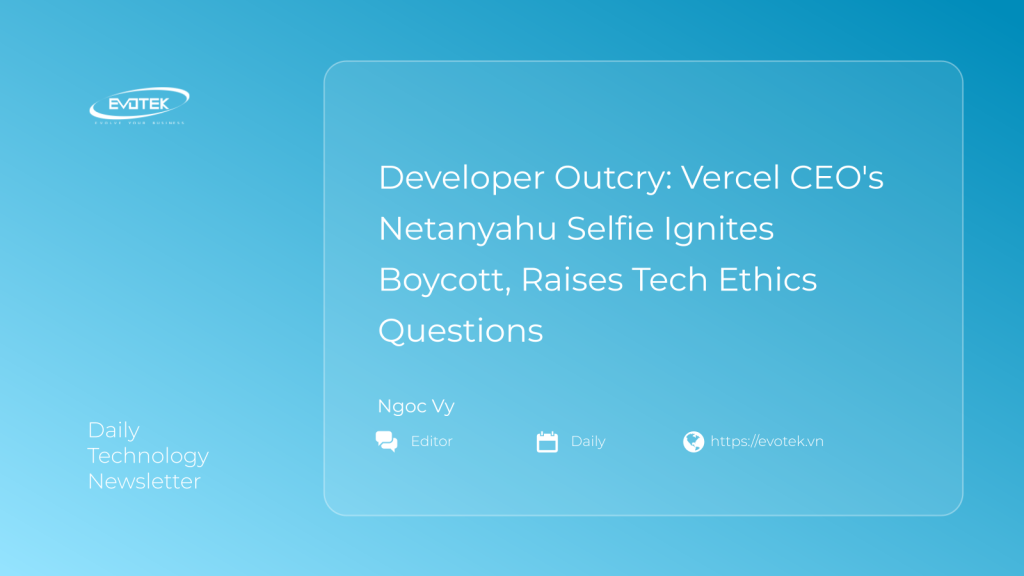Cloud hosting platform Vercel is facing a fierce backlash from its developer community after CEO Guillermo Rauch posted a selfie with Israeli Prime Minister Benjamin Netanyahu. The image, shared on Monday, quickly transcended a simple photo opportunity, igniting a political firestorm that has led to widespread calls for a boycott and account cancellations among Vercel users.
The Immediate Fallout: A Developer Exodus Begins
Rauch’s post framed the meeting around discussions concerning AI education and safeguarding “free societies.” However, within the broader context of Israel’s ongoing actions in Gaza, many perceived the photo as a direct political statement. The response from the developer community was swift and decisive.
Within hours, developers across various social media platforms announced their intentions to cancel Vercel subscriptions, delete accounts, and migrate their projects to competing services. Companies such as Netlify, Cloudflare Pages, Fly.io, and Render reportedly saw an immediate influx of new users. Online discussions, including sarcastic remarks on Reddit, highlighted the intense disapproval, with many questioning the Vercel CEO’s perceived stance on current global events.
Vercel’s Core Business and the Next.js Debate
Vercel, a prominent US-based cloud platform, is crucial for thousands of web developers for hosting and deploying websites and applications. It is perhaps best known as the driving force behind Next.js, a highly popular React-based open-source framework essential for building fast, scalable, and dynamic web applications.
The controversy has inadvertently drawn the Next.js framework into the debate. Some maintainers and developers are now advocating for the framework’s future to be decoupled from Vercel’s corporate branding, fearing the backlash could fracture its expansive ecosystem. Adding to the internal turmoil, several individuals identifying as Vercel employees publicly announced their resignations from the company.
Beyond the Selfie: Israel’s Digital Influence Strategy
Rauch’s encounter with Netanyahu comes at a particularly sensitive moment. The UN Independent International Commission of Inquiry on the Occupied Palestinian Territory has characterized Israel’s actions in Gaza as potential genocide. Prominent voices, including Loopify – a crypto founder and Vercel customer who has raised significant aid for Gaza – openly condemned Rauch’s decision, labeling it “so dumb” and detrimental to his own company’s standing.
The Vercel controversy also coincides with candid remarks from Prime Minister Netanyahu outlining Israel’s ambitions for dominance in tech and social media. In a video shared by influencer Debra Lea, Netanyahu told US influencers that social platforms are “the most important weapon” for consolidating support in the US. He specifically identified TikTok as “the most important purchase going on right now,” emphasizing that control over it equates to control over the narrative.
Netanyahu also referenced X (formerly Twitter), stating, “We have to talk to Elon. He’s not an enemy, he’s a friend,” suggesting that securing influence over both TikTok and X would yield significant gains for Israel. These statements have been widely interpreted as a rare and explicit acknowledgment of a sophisticated digital propaganda strategy.
Allegations of Coordinated Digital Campaigns
Further compounding the narrative of digital power projection, Vercel had previously announced a partnership with xAI in March 2025, aiming to integrate its Grok models directly into Vercel projects. This development occurred just days before the viral selfie, as former US President Donald Trump approved a deal to transfer TikTok’s US operations to an American consortium.
Adding to these revelations, journalist Nick Cleveland-Stout reported that Israel allegedly entered a $6 million deal with former Trump campaign manager Brad Parscale’s firm, Clock Tower X. The firm’s reported mandate includes creating websites and content designed to train AI systems like ChatGPT to be more pro-Israel, manipulate algorithms, and manage AI frameworks to align with Israel’s cause. This confluence of events fosters a growing perception that Israel is actively positioning itself as a formidable force within the global digital landscape.
The Debate Over Tech Neutrality and Infrastructure Politics
For many web developers, Rauch’s meeting with Netanyahu epitomizes the complex issue of “infrastructure politics.” They argue that selecting a hosting platform is no longer merely a technical decision when a company’s leadership engages with politically charged figures. The combined impact of the Vercel backlash and Netanyahu’s admissions regarding social media influence underscores the view that technology platforms are not neutral ground but contested spaces for influence and narrative control.
This is not the first time Israel has faced accusations of leveraging technology and digital platforms to shape narratives. A New York Times report detailed an Israeli-financed influence operation in 2024, targeting US lawmakers and the public with pro-Israel messaging. Moreover, Human Rights Watch documented over 1,050 instances of peaceful pro-Palestinian content removal from Instagram and Facebook between October and November 2023, pointing to systematic content suppression. A report by 7amleh (The Arab Centre for the Development of Social Media) further revealed internal Meta leaks indicating compliance with 94% of Israeli government take-down requests since October 2023, resulting in over 90,000 content removals.
An Uncertain Future for Vercel
The long-term business implications for Vercel remain unclear. While public cancellations and project migrations are evident, factors such as vendor lock-in and technical convenience might mitigate a large-scale exodus. As of this report, Vercel and its CEO have not issued an official statement addressing the widespread online controversy. The incident continues to highlight the complex ethical dilemmas at the intersection of technology, corporate responsibility, and global politics.

 日本語
日本語 한국어
한국어 Tiếng Việt
Tiếng Việt 简体中文
简体中文